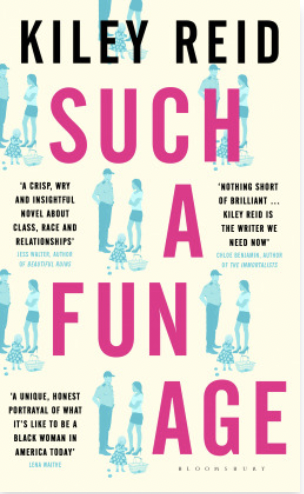Words by Saskia May, Books Editor
Kiley Reid’s debut novel, Such a Fun Age (2019) is an observant, entertaining, and current examination of privilege and racism in the US. Reid begins the novel by capturing an evening in Emira’s life, a twenty-five-year-old black college graduate struggling to make ends meet in Philadelphia and working part-time as a typist, part-time as a babysitter for the Chamberlain family. On a night out with her friends, Emira is called out of the blue and far past her arranged working hours by her white and wealthy employer Alix Chamberlain, who asks her to take her toddler Briar to the store.
In need of money, Emira agrees to abandon her plans and to babysit Briar, whom Emira adores, with one of her favourite pastimes, smelling bags of tea at the supermarket. Yet what starts as a simple grocery store visit has dangerous undertones, for Market Depot is an unsafe space for a young woman of colour such as Emira. The store’s clients are wealthy, privileged, and predominantly white customers, one of whom goes on to accuse Emira of kidnapping Briar, reporting her to a security guard. The standoff that follows between Emira and the security guard is tense, frightening, and humiliating for Emira. Whilst a bystander begins to film the rapidly escalating situation on his phone, the security guard threatens to call the police on Emira. Calling Mr Chamberlain to prove that she is in fact Briar’s babysitter, Emira is left to consider not only the insidious racism she has encountered but also how the Chamberlains will tackle her ordeal.
Emira’s worries about money, career ambitions and a sense of aim in her life will strike a chord with fellow young adult readers of the novel. Coming from a family of makers, who have all found their way in craftsmanship work, Emira herself has struggled to find her own passion and is constantly and anxiously comparing herself to her seemingly more successful group of friends. Whilst Emira loves taking care of the eccentric and sweet Briar, Reid highlights the uncomfortable dynamic of Black women’s domestic labour and care at the service of white, wealthy families like the Chamberlains. As Reid places Alix’s focalisation in flux with Emira’s, she captures the depths of their differences in terms of class and race.
Reid carefully contrasts Emira’s concerns with that of Alix Chamberlain, an upper middle class, so called social media feminist influencer, who has moved from New York and her affluent, “yummy mummy” friends, to Philadelphia. Whilst Alix has never previously made any effort to get to know her sitter, it is only after the Market Depot incident that she makes an effort to forge a connection with Emira, invasive attempts which involve snooping through her text messages. Alix’s white saviourism and increasingly obsessive attempts to get to know Emira are only so that Alix can ease her own guilt and appear progressive, fuelled further by a racially charged incident in Alix’s past that comes to light as the novel progresses.
Realism dominates Reid’s prose yet it is not overly stylistic or self-conscious. With sharply observed, nuanced characters, and dialogue that is both hilarious, shrewd and damning, Reid sets her scenes with lucid clarity. A particularly awkward and charged Thanksgiving dinner where the characters are placed together in less than desirable circumstances will have you on the edge of your seat.
Witty, astute and current, Kiley Reid has written a social satire of white, liberal ‘wokeness’ that promises to be a modern classic.

